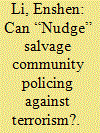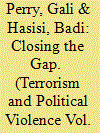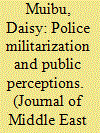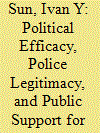|
|
|
Sort Order |
|
|
|
Items / Page
|
|
|
|
|
|
|
| Srl | Item |
| 1 |
ID:
190907


|
|
|
|
|
| Summary/Abstract |
Since the mid-2000s, the fear of “homegrown” terrorism in most developed democracies has prodded police to partner with local Muslim communities as a proactive and preventive approach to Islamic extremism. However, despite practical variations, this model of counterterrorism community policing (“CTCP”) has faced a comparable challenge—the lack of legal and moral legitimacy within counterterrorism law enforcement which erodes Muslim communities’ trust and confidence in policing. Drawing on common critiques of CTCP in the U.S., the U.K. and Australia, this article aims to proffer a behavioral-economics view to promote intended goals of CTCP. Borrowing the ideas of Nudge Theory, my discussion suggests that community engagement within CTCP could be stimulated more effectively through a subtle process of trust building whereby residents are coaxed toward cooperation through indirect encouragement, assistance and facilitation. Through a case study of CTCP in Muslim communities, it is argued that nudge entails the refrainment of the political and media narrative from conflating Islamist ideology with the prime source of domestic terrorist danger. At the grassroots level, the nudge-oriented CTCP is contingent upon community representatives taking on a more active and forefront role in CTCP with police reducing their visibility to only facilitate in the background.
|
|
|
|
|
|
|
|
|
|
|
|
|
|
|
|
| 2 |
ID:
175714


|
|
|
|
|
| Summary/Abstract |
In the aftermath of 9/11, aviation security has become a central component of counterterrorism. To mitigate threats whilst maintaining flight schedules, airport security officers require the cooperation of all passengers, but especially of ethnic minorities perceived as posing a potential threat to homeland security, often referred to as “suspect communities.” Passengers from suspect communities are subject to rigorous screening, but are also regarded as a source of information, making their cooperation even more important than that of other passengers. Nevertheless, suspect communities’ cooperation with airport security, and the gap between their attitudes and those of other passengers, have not yet been examined. The current study utilizes a survey of 1970 passengers at the Ben-Gurion airport in Israel, examining passengers’ perceptions of airport security and their willingness to cooperate. We find that passengers belonging to the suspect community of Israeli Muslims were less willing to cooperate with security procedures than all other passengers. However, when controlling for passengers’ perceptions of legitimacy and procedural justice, Israeli Muslims were more willing to cooperate with airport security than Israeli Jews. The findings highlight the importance of legitimacy and procedural justice perceptions in obtaining the cooperation of suspect communities, and suggest practical pathways for improving cooperation.
|
|
|
|
|
|
|
|
|
|
|
|
|
|
|
|
| 3 |
ID:
180654


|
|
|
|
|
| Summary/Abstract |
How can one encourage greater public cooperation with police forces and improve their legitimacy during times of protracted conflict and fragile governance? Can police militarization play a role in improving public perceptions toward law enforcement in these contexts? The prevailing perception is that police militarization undermines public opinion toward the police. Yet, there has been little empirical evaluation of the impact that militarization has on public attitudes in conflict-affected regions. Relying on original survey data collected in the city of Kismaayo, Somalia, this study examines the impact that perceived police militarization has on public perceptions toward a newly introduced police force operating in a region with an active insurgent-terrorist threat. Results of regression analysis and qualitative field interviews suggest that militarization can actually improve residents’ willingness to cooperate with the police, as well as perceptions of police legitimacy. The perceived militarization of this nascent police force conveys a level of preparedness and professionalism to residents exposed to decades of conflict.
|
|
|
|
|
|
|
|
|
|
|
|
|
|
|
|
| 4 |
ID:
188094


|
|
|
|
|
| Summary/Abstract |
The threat of terrorism has surfaced as a top priority in national and global security over the past two decades. Drawing upon survey data collected by the Chinese General Social Survey, this study assesses the relationships among political efficacy, police legitimacy, and public support for counterterrorism measures in China. The majority of surveyed Chinese people do not favor aggressive law enforcement actions even when a terrorist attack is imminent. Public support for different forms of antiterrorism means is inversely related to the level of coercion associated with each measure, with wiretapping receiving the highest support, followed by stop and search, and detention. Path analysis results showed that self-rated political knowledge lowers people’s positive evaluations of police legitimacy, whereas political influence strengthens such perception. Stronger senses of police legitimacy then lead to lower support for counterterrorism measures. Additionally, females and racial/ethnic minorities are less likely to favor aggressive antiterrorism activities, while older and college-educated people are more inclined to endorse counterterrorism measures. Implications for future research are discussed.
|
|
|
|
|
|
|
|
|
|
|
|
|
|
|
|
|
|
|
|
|